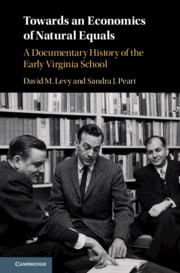Book contents
- Towards an Economics of Natural Equals
- Frontispiece
- Towards an Economics of Natural Equals
- Copyright page
- Dedication
- Contents
- Figures
- Tables
- Preface
- Acknowledgments
- 1 Why the Virginia School of Political Economy Matters
- 2 James Buchanan and the Return to an Economics of Natural Equals
- 3 “Almost Wholly Negative”: An Early Reaction to the Virginia School
- 4 “The Economics of Universal Education” and After: From Friedman to Rawls
- 5 Virginia Political Economy and Public Choice Economics
- 6 The Individuals and Their Connections
- 7 The Role of the Earhart Foundation in the Early Virginia School
- 8 The Virginia School and the Anti-democratic Right
- 9 Neoliberalism, the Virginia School, and the Geldard Report
- 10 Conclusion: Should the Virginia School be Restored?
- Select Bibliography
- Index
1 - Why the Virginia School of Political Economy Matters
Published online by Cambridge University Press: 16 December 2019
- Towards an Economics of Natural Equals
- Frontispiece
- Towards an Economics of Natural Equals
- Copyright page
- Dedication
- Contents
- Figures
- Tables
- Preface
- Acknowledgments
- 1 Why the Virginia School of Political Economy Matters
- 2 James Buchanan and the Return to an Economics of Natural Equals
- 3 “Almost Wholly Negative”: An Early Reaction to the Virginia School
- 4 “The Economics of Universal Education” and After: From Friedman to Rawls
- 5 Virginia Political Economy and Public Choice Economics
- 6 The Individuals and Their Connections
- 7 The Role of the Earhart Foundation in the Early Virginia School
- 8 The Virginia School and the Anti-democratic Right
- 9 Neoliberalism, the Virginia School, and the Geldard Report
- 10 Conclusion: Should the Virginia School be Restored?
- Select Bibliography
- Index
Summary
The early Virginia School of Economics builds upon the work of the British classical economists as extended by Knight at the University of Chicago. In opposition to the nascent economic orthodoxy's emphasis on efficiency, the Virginia School emphasized economic activity and policy as processes generated by discussion. One continuing controversy involves the status of group goals. Virginia's Vining defended the NBER against Koopmans’ criticism as atheoretic and thus inefficient. For Vining, the NBER attempted to discover hypotheses, an activity for which efficiency is undefined. Buchanan used the Knightian principle of government by discussion to argue that Arrow’s demonstration of an inefficient democracy assumed away the possibility of discovering one’s goals through discussion. Government by discussion has an unappreciated role in Buchanan’s development of Wicksell’s unanimity criterion into the view of politics as exchange. Who participates in the discussion? Only people who actually exist. That privileges the status quo and reduces the economist’s role to offering advice to fellow citizens as equals.
Keywords
- Type
- Chapter
- Information
- Towards an Economics of Natural EqualsA Documentary History of the Early Virginia School, pp. 1 - 21Publisher: Cambridge University PressPrint publication year: 2020



